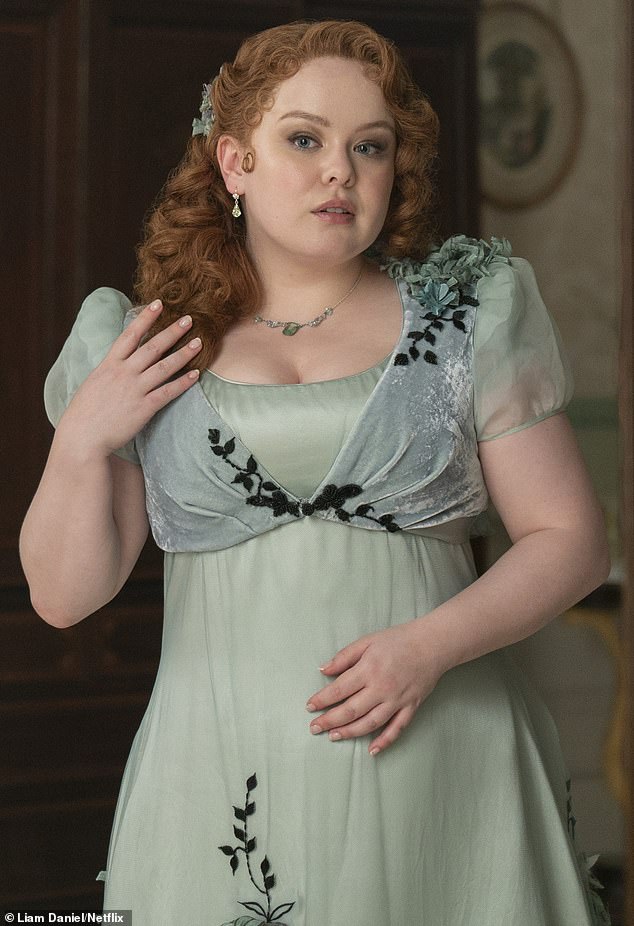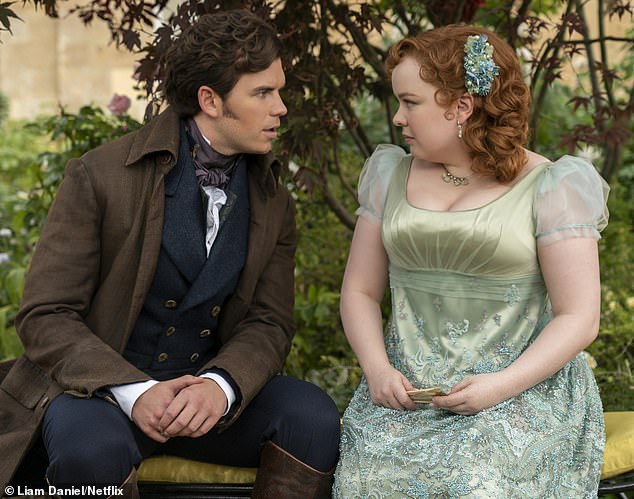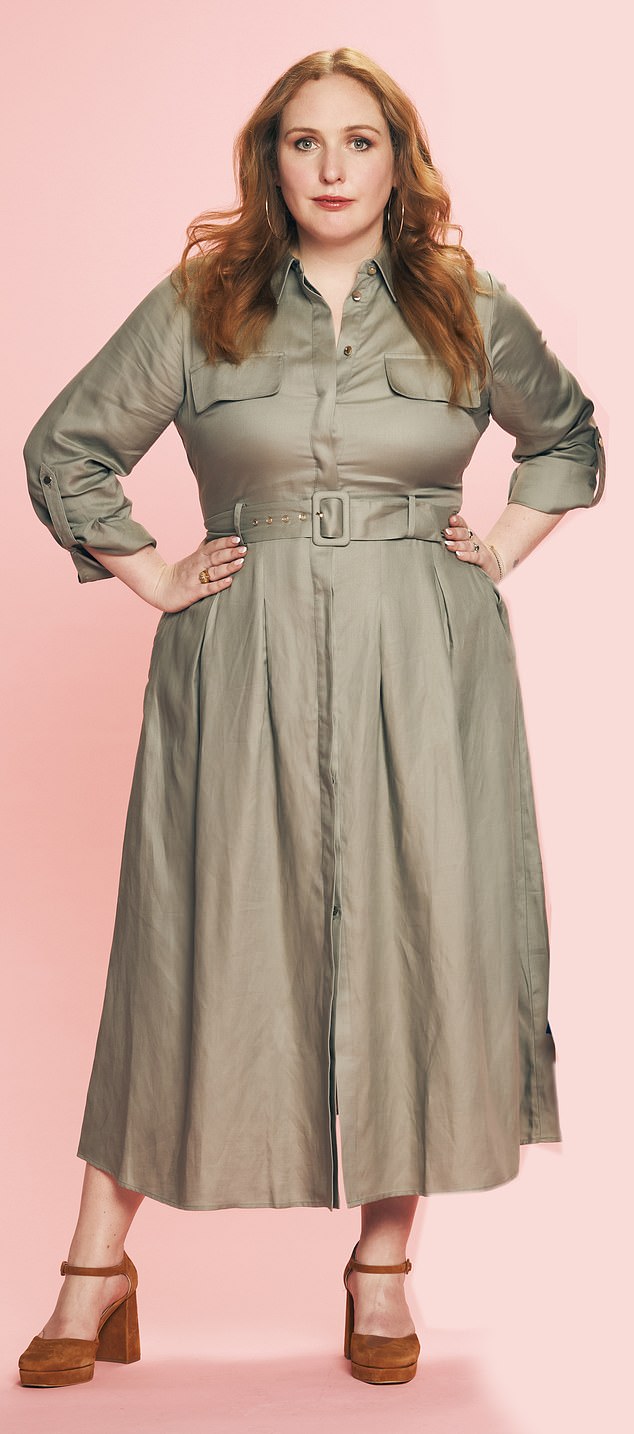“Your mind is a dark and haunting graveyard,” the woman intoned in a theatrical whisper. “You despise your body and what you see in the mirror.”
It was a Friday afternoon and she was sitting in a room with three other journalists while a psychic named Sharon “read my soul.”
I listened to my colleagues’ readings and, strangely, body image was not mentioned once. But a quick scan of my body and Sharon’s “reading” was decided: I was a size 16 (two or three sizes larger than the other women in the room), so of course I must hate my body.
Sharon wasn’t psychic, of course; she was cold reading me, making a high probability guess based on the facts in front of her. And to be honest, it was a fair assumption.
The writer Catriona Innes says she is happy and confident about her body and her dress size.

Bridgerton star Nicola Coughlan as Penelope Featherington in series 3 of the hit Netflix show.
Women in the UK have one of the lowest levels of body confidence in the world, with 61 per cent of adults reporting feeling negative about their body image most of the time, according to a recent survey.
As for the “ideal” dress size? A YouGov study found that almost two-thirds of us think the “perfect” size is a size 12. Throughout my life as a size 16 to 18 woman, the message has been clear: if you are a size 16 or larger, you must hate your body and get stuck in a cycle of dieting and self-loathing.
That has not been my experience. At 38 years old I have a healthy body image. I don’t high-five myself in the mirror every day, but I’m finally happy with the way I look. I don’t waste hours agonizing over my size, wishing I was thinner.
I have sex with the light on, go naked bathing with strangers, and wear clothes based on what I want to wear, rather than what will make me look “thinner.”
However, that doesn’t stop people from assuming that I really hate the way I look. So I’m delighted to see Bridgerton star Nicola Coughlan fight the assumptions people make about her self-image.
The second part of the current season of the hit Netflix show, rumored to include the most daring scenes yet, launches today, amid criticism over Nicola’s appearance since the first episodes were released last month. A cruel article in The Spectator sparked a firestorm of controversy by claiming that the idea of a “fat girl winning over the prince” was not “plausible.”
And last week a video emerged in which a journalist called Nicola “very brave” to play Penelope Featherington. Quick as lightning, she responded: “It’s hard because I think women with my body type (women with perfect breasts) can’t see ourselves enough on screen.”
I could have stood up and applauded. It is not the first time that he combats stereotypes about his body with humor.
“I can’t believe I’m the lead on a romantic show,” the 37-year-old told Harper’s Bazaar. “And it’s not because I find myself horrible, as some people have assumed when I say that (just so you know, in the right lighting, I’m a solid seven).”

Catriona says that many times plus-size women are portrayed as just the sidekick or punchline to a joke, so it’s refreshing to see Penelope as the love interest of Colin, played by Luke Newton.
In the past, Nicola has had to ask her fans to stop commenting on her figure, saying on Instagram: “If you have an opinion about my body, please don’t share it with me.”
She goes on in her Harper’s Bazaar article to say that she is constantly asked about her body, rather than her work. This sends the message that he shouldn’t like her body.
Our culture dictates that we should pity those who don’t fit the Hollywood mold. But while her dress size is her business alone, I’m thrilled to see someone with a smooth, curvy figure take center stage as the romantic heroine of one of the summer’s biggest shows.
Nicola herself has described her sex scenes as “incredibly empowering”, adding: “I felt like the biggest ‘fuck you’ in the whole conversation about my body.”
Because so often in film and television, the bodies portrayed as “worthy” of sex and romance are super skinny or almost impossibly curvy, with flat stomachs but round butts and big breasts.
There have been few representations of the glorious diversity of women’s bodies, and too often plus-size women are portrayed only as the sidekick or, worse, the punchline to a joke.
These representations matter. The only times I’ve hated my body are when other people decide I should. Like when I ran a half marathon and so many people told me how “great” it would be because I would “lose so much weight.”
My size wasn’t the reason I signed up, but since I hadn’t lost a pound after months of training, I felt deflated as I ran to the finish line.
Another time, when I lost some weight, a colleague came up to me and said, “Make sure you stick with whatever diet you’re on.” When I stopped drinking for three months, there were comments ranging from “Is it a diet thing?” to ‘Yes, there is a lot of sugar in wine.’
Personal trainers almost always ask me if I’m interested in hearing about fat loss when I embark on a new program. Hmmm, maybe I’m just interested in improving my fitness and feeling stronger?
Even simply telling someone my size can elicit comments like, “Oh, but you don’t look like a size 16/18,” an innocent but insulting comment that implies a) by mentioning my measurements, I was being cruel to myself and therefore needs a ‘compliment’, and b) that a size 16/18 is something no one wants to be.
People are rarely outright cruel, it’s just that their assumptions imply that plus-size women should want to be thinner, which often, in turn, makes us want to be thinner.
Of course, each of us has a unique relationship with our own body and, unfortunately, it is often negative. As such, the comments people make often have less to do with what they see in others than what they see or dislike in themselves.
My thinner friends say they’ve faced the opposite assumption: that because they’re thin, they must be happy with themselves and have “nothing to complain about.” If they want to talk openly about how they feel, they are rejected.
All I want people to understand is that it’s not as simple as: size 8 = self-love and size 16 = self-loathing. I have had to work hard to reach my own levels of confidence in my body. And a big part of that has involved reminding myself, like Nicola, that I am more than my outward appearance; I am good at my job and I have friends, family and a husband who loves me very much.
With each passing year I feel more confident, despite moving further and further away from what society tells me is beautiful.
This has also changed the way I am seen: it has been a long time since I received an insulting comment about my appearance. I like to think this is due to my growing confidence, but it could be because I’m reaching an age where society assumes I no longer care about my appearance, as women become almost invisible as they age.
Could you please address age discrimination next, Netflix?

